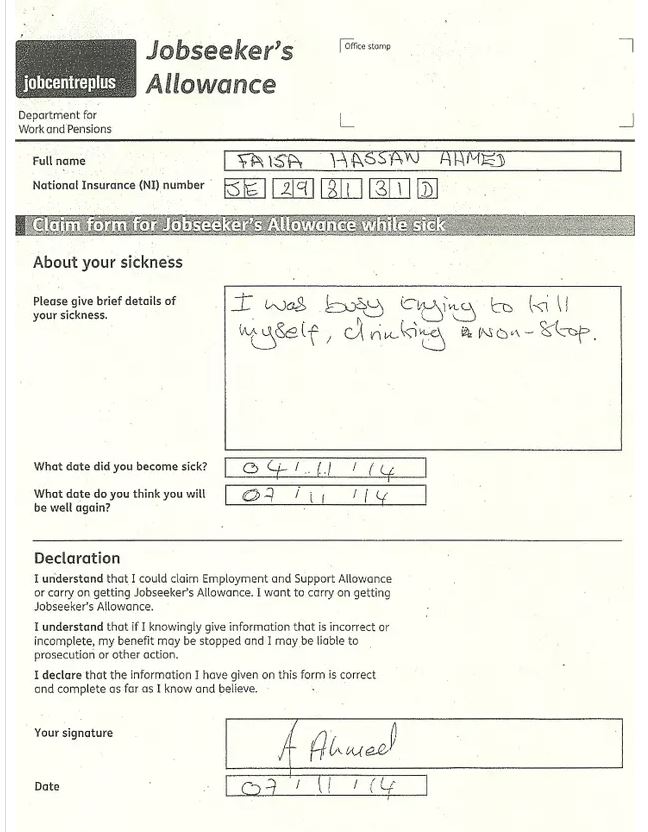
Shared from Disability News Service, with thanks
DWP ignored coroner’s call to take action to save claimants from suicide
By John Pring on 16th July 2020
The Department for Work and Pensions (DWP) rejected a coroner’s call to act to prevent benefit claimants taking their own lives, following the suicide of a young woman who had told her work coach that she intended to kill herself.
Documents released this week under the Freedom of Information Act show that the DWP dismissed both the coroner’s plea to take action, and the findings of an inquest jury which had concluded that a jobcentre’s failings had contributed to the death of 31-year-old Faiza Ahmed (pictured), from Limehouse, east London.
But the documents have also led to fresh allegations of institutional racism and have again exposed the cruelty and harshness of DWP’s benefit sanctions regime.
They were released as the Green party’s co-leader, Jonathan Bartley, wrote to the chair of the Equality and Human Rights Commission, asking it to reconsider its decision not to hold its own inquiry this year into the deaths of claimants that have been linked to DWP.
This week, Faiza’s brother, Mohammed, told Disability News Service (DNS) that DWP had shown no remorse after his sister’s death.
He has backed growing calls for a judge-led inquiry into links between DWP and the deaths of claimants.
The eight-day inquest led to a narrative verdict by the jury, which concluded that failures by DWP, London Ambulance Service and the Metropolitan police all contributed to his sister’s death on 7 November 2014.
The coroner, Mary Hassell, produced a prevention of future deaths (PFD) report – a step taken by coroners when they think individuals or organisations can take action to prevent further deaths – and sent it to the police, ambulance service and DWP.
Their responses have only been released for the first time this week following a series of freedom of information requests by DNS.
The Judicial Office said this week that the PFD report into Ahmed’s death was not previously published on the website of the chief coroner due to an “administrative oversight”.
The report was written in January 2016, just a few months after DNS had revealed the existence of another PFD, also written by Mary Hassell, following the suicide of Michael O’Sullivan, from north London.
That PFD, which concluded that O’Sullivan’s death was triggered by the decision to wrongly find him fit for work, had led to the prime minister twice being questioned over DWP’s failings in the House of Commons.
Years of further revelations have followed, linking DWP with further deaths of claimants and exposing its repeated efforts to cover up those links, amid growing calls for an independent inquiry, and even calls for criminal prosecutions of ministers and senior civil servants for misconduct in public office.
Now, with the documents released this week, that pressure on DWP should increase again.
The documents show that, when responding to the PFD report written by Mary Hassell at the end of Faiza Ahmed’s inquest, DWP dismissed both the jury’s findings and the coroner’s call for action.
The inquest in January 2016 had lasted eight days.
It heard that Faiza had a history of mental distress and became suicidal during two days in November 2014, after reporting an attempted rape in her home.
The inquest heard of failings by the police officers who visited her after she reported the attempted rape early on 6 November, and further failings of the force and the ambulance service after she called for an ambulance the next afternoon and said she wanted to kill herself.
She took her own life shortly after the emergency services left her flat that afternoon.
But earlier that day – as described by the Guardian’s Simon Hattenstone, who covered the inquest in January 2016 – she had visited Poplar jobcentre to explain why she was three days late to sign on for jobseeker’s allowance.
A statement from her brother, read out at the inquest, described how Faiza had previously been sanctioned by the jobcentre for turning up late and missing appointments, and lived with the constant fear of being sanctioned, and the understanding that DWP did not believe her when she said she had depression.
Mohammed told DNS this week that Faiza had been sanctioned at least once and was “regularly threatened” with further sanctions.
He said this had a “horrible” impact on her. “Whenever we saw her, she was absolutely broken from it,” he said. “She was scared, worried and upset.
“She was a strong, independent person but she knew that if she was sanctioned, she would have nothing.
“As much as we were there to help her, both financially and emotionally, she wanted to do things for herself, so she was too proud to ask for anything.”
He said DWP’s sanctions regime was “horrific” and was based on “threats and intimidation”.
When Faiza arrived at the jobcentre on 7 November, she was given a form by the work coach to explain her failure to sign on for jobseeker’s allowance (JSA) on time.
She wrote on the form that, between 4 and 7 November, she had been “busy trying to kill myself, drinking non-stop”. She left the moment she handed over the form.

After she had gone, the work coach discussed what she had written with a manager, but they decided not to contact the emergency services.
DWP’s “six-point plan” says its staff should summon emergency help if a claimant declares an attempt to kill themselves and is “distressed, at serious risk or in immediate danger”.
But that action was not taken. Instead, the inquest heard, someone at the jobcentre made an urgent referral to the community mental health team, but not until five days later. By that time, Faiza had been dead for nearly five days.
In its response to the PFD, DWP said: “In this case, based on the information he had, the Work Coach made a judgement that there was no immediate risk to her safety.”
DWP said this information was the form she had completed and her attendance at the jobcentre so she could continue receiving her JSA.
DWP claimed that its processes “were followed both diligently and correctly”, and that its staff “took the necessary steps to invoke the agreed processes that would manage the risk appropriately”, which was “based on the evidence that staff were presented with”.
It added: “It is not our view that any opportunity to engage with any other organisations was missed.”
It said its approach was “under continual review and development”, and the only action it would take would be to issue a reminder to all DWP staff about its existing guidance on suicidal ideation, the same guidance which had failed to save Faiza Ahmed from taking her own life.
It is not known whether, or in what form, this reminder was issued.
Faiza’s brother, Mohammed, an officer with London Fire Brigade, told DNS this week that he had been very close to his sister, and remembering how she was treated still makes him angry, nearly six years after she died.
He said: “There isn’t a day goes by when I don’t think of my sister.”
It was only through the family’s efforts, and the support of campaigners and lawyers, that they secured a longer inquest to examine in front of a jury whether any public body had contributed to Faiza’s death.
Otherwise, there would have been a shorter inquest and the failings of DWP would probably never have been exposed.
Mohammed said he remembered DWP’s attitude as “blasé” and that its refusal to accept the criticism and the call for action from the coroner’s PFD and the jury “was no surprise” as the department had been “very defensive, very guarded, not looking to help” and had shown “no remorse”.
He is certain that racism lay at the heart of the way his sister was treated by DWP, even if it was “indirect” and not immediately obvious.
This was because the harshness of austerity and DWP’s welfare reforms had a disproportionate impact on people of colour, he said.
He said: “You can’t separate it. It definitely, definitely had an impact; 100 per cent it was there.”
He believes the jobcentre would have called the emergency services if his sister had been a white woman.
He added: “The class thing doubles it up. Would it have happened to a young white woman in Hampstead Heath? No, not in my opinion.”
To this day, he cannot understand how the jobcentre could have failed to act after seeing the state his sister was in and what she had written on the form. Instead, he said, they just “waved it off”.
Now he believes DWP has “got away with it”.
He has backed growing calls for an independent inquiry into links between DWP and the deaths of benefit claimants.
He said: “A judge-led inquiry on its own would be some justice. It would at least have some weight and would get justice for those families.”
Even better, he says, would be for former work and pensions secretary Iain Duncan Smith, who was in charge of DWP when his sister died, to be brought to justice.
DNS has previously laid out a case for Duncan Smith and other senior DWP figures to face criminal charges of misconduct in public office.
Mohammed said: “For a lot of people who have lost their loved ones and certainly for me, Iain Duncan Smith being brought to bear in some way would be one of the most wonderful days ever in history.
“But an inquiry which highlighted what they did was wrong and should never have happened would go a long way for me towards some kind of closure for me for my sister, 100 per cent.”
Following his sister’s death and through the inquest, their family were supported by the grassroots women’s group Women Against Rape.
Lisa Longstaff, from Women Against Rape, said: “Faiza’s tragic suicide exposed the racism and uncaring cruelty of the DWP’s sanction regime.
“We’ve worked with many women up against similar brutality when trying to get basic benefits or compensation to recover after rape.
“Often it’s been women in the movement who’ve challenged these appalling injustices and campaigned for everyone’s rights, but that work goes mostly unacknowledged.”
A spokesperson for the Judicial Office said the PFD report had not been published until this week because of an “administrative oversight” by the chief coroner’s office.
A DWP spokesperson said its position was laid out in the response to the coroner’s PFD, and declined to comment further.
The department refused to say how it justified its failure to take any action in response to the PFD report, other than reminding staff of existing guidance.
It also refused to say when its response was sent to the coroner, and whether it had asked the chief coroner not to publish the PFD.
It refused to say whether its actions demonstrated a continuing culture that was putting the safety and lives of benefit claimants at risk, and which the department was refusing to address.
And it refused to say why it had made a referral to Faiza Ahmed’s community mental health team five days after she had killed herself.
